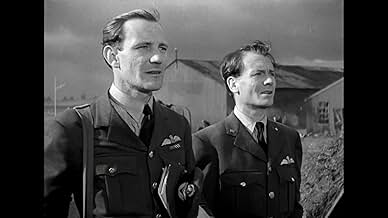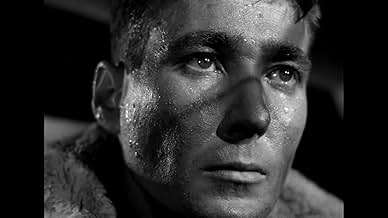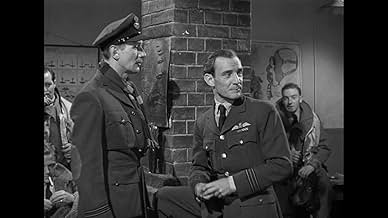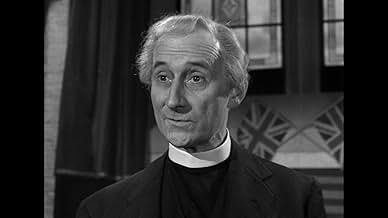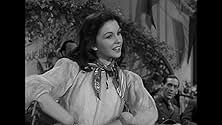The Way to the Stars
- 1945
- 1h 49min
VALUTAZIONE IMDb
7,3/10
1736
LA TUA VALUTAZIONE
Aggiungi una trama nella tua linguaThe wartime daily routine on a British bomber base in southeastern England is revealed through the eyes of newly arrived Flying Officer Peter Penrose (Sir John Mills).The wartime daily routine on a British bomber base in southeastern England is revealed through the eyes of newly arrived Flying Officer Peter Penrose (Sir John Mills).The wartime daily routine on a British bomber base in southeastern England is revealed through the eyes of newly arrived Flying Officer Peter Penrose (Sir John Mills).
- Regia
- Sceneggiatura
- Star
- Premi
- 1 candidatura in totale
Renée Asherson
- Iris Winterton
- (as Renee Asherson)
Bonar Colleano
- Joe Friselli
- (as Bonar Colleano Jnr)
Nicholas Stuart
- Col. Rogers
- (as Tryon Nichol)
Bill Owen
- 'Nobby' Clarke
- (as Bill Rowbotham)
Recensioni in evidenza
The great thing about this war flying film is that there's hardly any flying in it. It's all about the terrible toll war takes on normal people. What makes it so gripping to a modern audience is how the characteristic emotional restraint of people at that time is so faithfully portrayed. That's why it doesn't date. You just know that's how people really were back then.
Above all, it's the Rattigan screenplay, with its wonderful trilogical structure that speaks out.
If you want to see how people really felt and acted in England in WW2, in a beautiful, tragic film, then you must see it.
Above all, it's the Rattigan screenplay, with its wonderful trilogical structure that speaks out.
If you want to see how people really felt and acted in England in WW2, in a beautiful, tragic film, then you must see it.
The Way to the Stars begins on a downcast and flat footed note, a rather downbeat and dreary voice over as the camera sweeps its way through an old airfield long since abandoned. The voice is nostalgic, the tone full of regret and longing for the days of old. The camera nervously approaches the air field, as if afraid to go in, but does so and creeps around looking at markings on the wall; individual shelves and what-not that's still around. The year is 1945, and The Second World War is over; at least until the film triumphantly darts back to 1940 to a resounding chorus and tremendous score: hark, a plane in the RAF lands to a merry tune and all seems right again with activity and action clogging up the screen as busy bodies dart around and planes come and go. Despite this description, this is not a film that longs for conflict during times of war; rather the interaction and sense of togetherness it believes war brings out in people as they fight the cause. The opening tone in the aftermath of the mammoth event that was WWII suggests alienation, a sense of "where do we go from here?" Back in the day, The War was on; everyone knew their duty and would bond – we realise that the film doesn't miss The War itself, but rather the unity and relationships that formed out of The War as relics from days of old are ruefully lingered on.
In making The Way to the Stars, director Anthony Asquith has crafted a war film not entirely about the death and destruction of that time but the good that comes out of pulling together and forging certain relationships. Would young pilot Peter Penrose (Mills) have met young Iris (Asherson) had The War not been on?; would young American pilot John Hollis (Montgomery) have bonded with public house owner Miss Todd (John) had The War not been on? Would she be the same person after The War had she not gone through what she experienced with a certain flight lieutenant? Certainly not, in fact one moment much later on sees both Hollis and Todd share a moment in which they reflect on the implausibility of Americans visiting the exact setting they share under normal circumstances. But that's not to say it doesn't remember the war dead entirely, despite channelling (through Asherson's character) a sense of romping on with business; that despite loosing her husband of two years to The War, the film disallows her to grieve too heavily and instead places her on a path that sees her continue her role to play upstanding hostess and fuel the local pilots with escapism in the form of alcohol and unity, as well as later interaction with said American.
The film is a really well observed character piece; focusing on and manifesting a number of relationships in and around both a local airfield which houses Allied bombers and a public house named The Golden Lion. In 1940, all sorts of Royal Air Force members retain that fighting spirit and keep their chins up as German bombing threatens the air field and general area. The men are unperturbed, taking cover and keeping spirits high by nattering about menial things to distract themselves in that manner most films of the era had them positively presented. The presentation of masculinity, particularly in those between a young and middle age is mostly positive and upbeat with a young graduate has an opportunity to lie to a senior about some test scores but concedes to the truth another pilot is seen to help out in the kitchen of that local pub-come-hotel as he woos the owner with poetry.
Hounesty; resilience; an eye for the arts and always keen to lend a helping hand is the order of the day as these positive masculine traits are played out under a banner of strength through teamwork and ability to both connect and link with those of other cultures. For a film about men and male pilots; female character Miss Todd is impressively given a fair share of development; while young, initially snappy Penrose attempts to court a young woman named Iris are thwarted by her domineering aunt, a resident at the hotel, who'll have nothing of it if it means veering too far away from her. Penrose's arc will see him initially adopt one of the lead roles, something we were led into believing may have been Todd's husband, a certain David Archdale (Redgrave), who's in charge of the airmen before marrying and being granted a fairer share of screen time. Penrose is then is allowed to develop from a young hot-head into a calmer, more rueful and thoughtful young man more-so by way of the effects of the war on the home and those around him than any 'action' he saw overseas.
The film has a little more fun when the Americans arrive in '42, respectfully shifting tracts from loss of a friend and lover to a more comedic tone running on a clashing of cultures in detailing the differences in sports, beverages and sandwich fillings these two sides share. Their obvious initial ill-fitting to the locale exemplified in their upsetting of the 'old guard' in Iris' elderly aunt when she fails to connect with the young American pilots and their leisurely habits. That's not to say they're limited to alienated clowns though, as a certain Johnny Hollis will go on to take a rather predominant role; he himself alienated away from home and here rendering the piece not of a wholly begging ilk destined to highlight how solely bad the British had it. Through Hollis, the idea is that nationality is immaterial. In restricting his servants of The War to bombers and bombardiers, Asquith is reliant on how the effects of missions affect the life back home on the ground and in this sense, succeeds, culminating in a worthy effort that's worth seeing.
In making The Way to the Stars, director Anthony Asquith has crafted a war film not entirely about the death and destruction of that time but the good that comes out of pulling together and forging certain relationships. Would young pilot Peter Penrose (Mills) have met young Iris (Asherson) had The War not been on?; would young American pilot John Hollis (Montgomery) have bonded with public house owner Miss Todd (John) had The War not been on? Would she be the same person after The War had she not gone through what she experienced with a certain flight lieutenant? Certainly not, in fact one moment much later on sees both Hollis and Todd share a moment in which they reflect on the implausibility of Americans visiting the exact setting they share under normal circumstances. But that's not to say it doesn't remember the war dead entirely, despite channelling (through Asherson's character) a sense of romping on with business; that despite loosing her husband of two years to The War, the film disallows her to grieve too heavily and instead places her on a path that sees her continue her role to play upstanding hostess and fuel the local pilots with escapism in the form of alcohol and unity, as well as later interaction with said American.
The film is a really well observed character piece; focusing on and manifesting a number of relationships in and around both a local airfield which houses Allied bombers and a public house named The Golden Lion. In 1940, all sorts of Royal Air Force members retain that fighting spirit and keep their chins up as German bombing threatens the air field and general area. The men are unperturbed, taking cover and keeping spirits high by nattering about menial things to distract themselves in that manner most films of the era had them positively presented. The presentation of masculinity, particularly in those between a young and middle age is mostly positive and upbeat with a young graduate has an opportunity to lie to a senior about some test scores but concedes to the truth another pilot is seen to help out in the kitchen of that local pub-come-hotel as he woos the owner with poetry.
Hounesty; resilience; an eye for the arts and always keen to lend a helping hand is the order of the day as these positive masculine traits are played out under a banner of strength through teamwork and ability to both connect and link with those of other cultures. For a film about men and male pilots; female character Miss Todd is impressively given a fair share of development; while young, initially snappy Penrose attempts to court a young woman named Iris are thwarted by her domineering aunt, a resident at the hotel, who'll have nothing of it if it means veering too far away from her. Penrose's arc will see him initially adopt one of the lead roles, something we were led into believing may have been Todd's husband, a certain David Archdale (Redgrave), who's in charge of the airmen before marrying and being granted a fairer share of screen time. Penrose is then is allowed to develop from a young hot-head into a calmer, more rueful and thoughtful young man more-so by way of the effects of the war on the home and those around him than any 'action' he saw overseas.
The film has a little more fun when the Americans arrive in '42, respectfully shifting tracts from loss of a friend and lover to a more comedic tone running on a clashing of cultures in detailing the differences in sports, beverages and sandwich fillings these two sides share. Their obvious initial ill-fitting to the locale exemplified in their upsetting of the 'old guard' in Iris' elderly aunt when she fails to connect with the young American pilots and their leisurely habits. That's not to say they're limited to alienated clowns though, as a certain Johnny Hollis will go on to take a rather predominant role; he himself alienated away from home and here rendering the piece not of a wholly begging ilk destined to highlight how solely bad the British had it. Through Hollis, the idea is that nationality is immaterial. In restricting his servants of The War to bombers and bombardiers, Asquith is reliant on how the effects of missions affect the life back home on the ground and in this sense, succeeds, culminating in a worthy effort that's worth seeing.
Certainly one of the best films to come out of the second world war. Basically the story of a mixture of American and English servicemen placed together on an air force base in England. The film depicts the tragedies of the air crews and their missions over Germany, as well as the comedy side of the English and American airmen each trying to teach the other the game of baseball and cricket. Some superb acting by an outstanding cast. But where oh where can one obtain this splendid movie ???
The day i watched this film it was cold and damp outside, I settled in, turned up the heating, supplied myself with tea and cigarettes and was transported back to a black & white time in the 1940's when the world was fighting to keep Hitler at bay. The film is set on a RAF airfield, following the lives of several characters throughout the war. The filmmakers have done a great job in putting together an excellent cast, including the ever watchable John Mills,a young Bill Owen (Compo-only British people will know what I mean) Basil Radford and Michael Redgrave.The acting and screen writing is very natural and you are quickly sucked in to a way of life, of living, manners, morals, speech patterns, quiet heroism, that just doesn't exist anymore. There is no battles or bombings, all we see are the planes taking off and landing, but we don't need that, this film is about people and love and relationships, humour in the face of adversity, having to accept the death of your friends. There is good comedy relief in the shape the American air force guys who come to the base and the great Stanley Holloway. Check this film out it is excellent
What an excellent film, with a cast that lifts it above other films made during WW2. Was there a British war film made that did not have John Mills starring in it? Many of the actors here went on to become familiar faces in film and British TV. The story-line and the absence of background music do make this film both nostalgic and entertaining.
It may interest some that the 'Golden Lion' in the film does exist, it is a hotel in Northallerton, North Yorkshire. The street scenes were shot in nearby Bedale. I'm not sure which airfield was used, but it may have been one of the many bomber bases situated in this area, such as Leeming or Dishforth.
It may interest some that the 'Golden Lion' in the film does exist, it is a hotel in Northallerton, North Yorkshire. The street scenes were shot in nearby Bedale. I'm not sure which airfield was used, but it may have been one of the many bomber bases situated in this area, such as Leeming or Dishforth.
Lo sapevi?
- QuizThe poem "For Johnny" read by Sir John Mills is as follows: "Do not despair, For Johnny-head-in-air; He sleeps as sound, As Johnny underground. Fetch out no shroud, For Johnny-in-the-cloud; And keep your tears, For him in after years. Better by far, For Johnny-the-bright-star, To keep your head, And see his children fed."
- BlooperAs the American pilot alights to join the first US bombers leaving to bomb the Nazis on "Aug. 17" (1942) his Mae West is visibly stenciled: "Insp 5/3/44" .
- Citazioni
Squadron Leader Sil Carter: Well, chaps, as you know the target for this afternoon is exactly the same as yesterday's, and the day before yesterday's, and the day before that. Calais. Barge concentrations.
- Curiosità sui creditiThe end credits play over a night sky showing a crescent moon and many stars.
I più visti
Accedi per valutare e creare un elenco di titoli salvati per ottenere consigli personalizzati
- How long is Johnny in the Clouds?Powered by Alexa
Dettagli
- Data di uscita
- Paese di origine
- Lingua
- Celebre anche come
- Johnny in the Clouds
- Luoghi delle riprese
- The Golden Lion Hotel, 114 High Street, Northallerton, North Yorkshire, Inghilterra, Regno Unito(exteriors of village pub)
- Azienda produttrice
- Vedi altri crediti dell’azienda su IMDbPro
- Tempo di esecuzione1 ora 49 minuti
- Colore
- Proporzioni
- 1.37 : 1
Contribuisci a questa pagina
Suggerisci una modifica o aggiungi i contenuti mancanti

Divario superiore
By what name was The Way to the Stars (1945) officially released in India in English?
Rispondi
